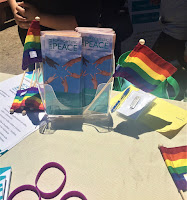Article: Voces and LGBTQ Communities
Although there are an estimated 9 million LGBTQ (Lesbian, Gay, Bisexual, Transgender, Queer) adults in the US (approx. 3.5% of the adult population), LGBTQ communities are often overlooked in domestic violence research and underrepresented in services, prevention, and intervention. Research surrounding domestic violence rates and other statistics frequently ignore same-sex relationships. Additionally, many systems that have been created to help survivors of domestic violence have a complex history of inadequately serving LGBTQ communities. Survivors of domestic violence are already aware of potential stereotypes and stigma, which are only exacerbated for survivors within LGBTQ communities.
Survivors of domestic violence and LGBTQ communities also are impacted by internalized oppression and isolation. This internalized oppression can prevent survivors from seeking help and resources, which can keep them in an abusive situation longer. Isolation used by abusers to restrict victims from accessing resources is often magnified within LGBTQ communities. Further isolation can result from the absence of a support system after coming out to family and friends. Abusers can use this isolation to keep victims in the relationship longer.
Center for Domestic Peace (C4DP) has increased its outreach efforts to LGBTQ communities in order to highlight resources and assistance that is readily available. C4DP’s Spanish-speaking community organizing group of DV survivors, Voces de Cambio, has set a goal of expanding its reach to become more involved in LGBTQ communities. A key goal of Voces is to inform survivors of their rights, with an emphasis on reaching underserved communities. To increase their awareness and sensitivity to LGBTQ populations, Voces participated in two different webinars presented by the Northwest Network of Bi, Trans, Lesbian and Gay Survivors of Abuse. During Pride Month, Voces participated in the Marin Pride Picnic, coordinated by the Spahr Center, to show the community that C4DP is a strong ally and offers services to all survivors.
As a result of experience gained through the webinars and direct engagement with LGBTQ communities, Voces has acknowledged that homophobia toward LGBTQ communities of color is very entrenched. They set the goal to help Latino LGBTQ members open up to their families and communities members. At the same time, Voces is working to build the capacity of straight Latinos to trust and accept their LGBTQ family and community members. Voces is excited to help another marginalized community that is often neglected. To learn more about Voces, please visit our website at https://c4dp.org/voces-de-cambio

